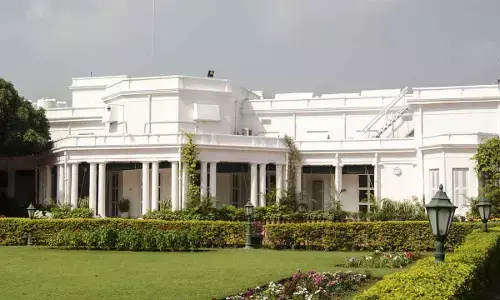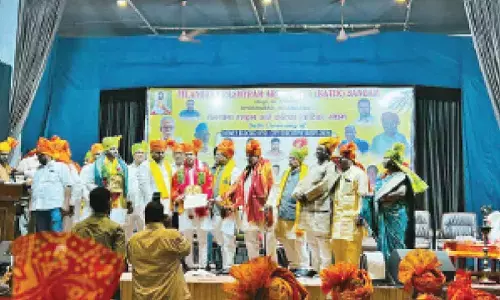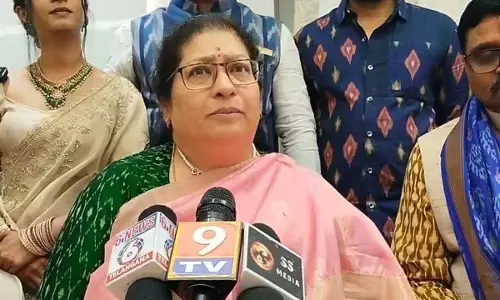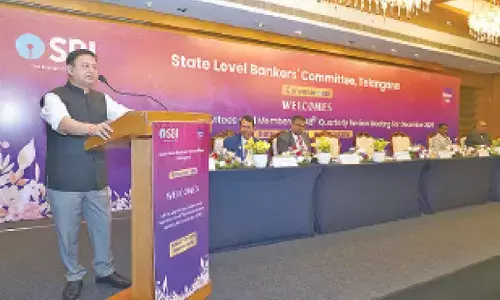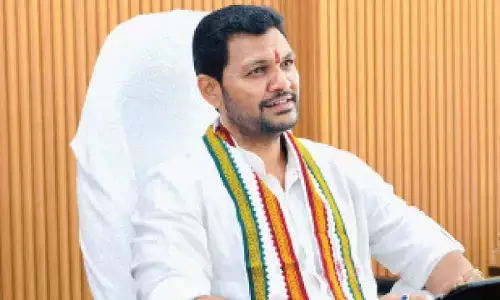14th Finance Commission funds devolution to Bangaru Telangana

As per the Article 280 of the Constitution of India the 14th Finance Commission (FFC) has made recommendations for distribution of the net proceeds of taxes of the Central Government between the Center and the States (vertical devolution); and the allocation among the States (horizontal devolution).
14th Finance Commission
As per the Article 280 of the Constitution of India the 14th Finance Commission (FFC) has made recommendations for distribution of the net proceeds of taxes of the Central Government between the Center and the States (vertical devolution); and the allocation among the States (horizontal devolution). These recommendations will guide the tax distributions during the period 2015 to 2020.
Major Recommendations of the 14th Finance Commission
With regard to vertical distribution, the States’ share in the net proceeds of the Union tax revenues is 42% from 32% recommended by the 13th Finance Commission. This is a huge increase when compared to previous Finance Commissions. The philosophy of the FFC is to reduce Central assistance to State Plans as a whole and be replaced by greater devolution of taxes. In recommending horizontal distribution, the FFC has used broad parameters of the population (1971) and changes in the population since then, income distance, forest cover, and area. The details of this criteria and the weight assigned to them are given in Table 1.
Table: Criteria and Weights Assigned for determination of States' share
| Criteria | Weight (percent) |
| Population | 17.5 |
| Demographic Change | 10 |
| Income Distance | 50 |
| Area | 15 |
| Forest Cover | 7.5 |
| Total | 100 |
Following the horizontal distribution criteria, the share of Telangana is worked out to be 2.44 percent of total tax devolutions. The State-wise share of the divisible pool of Central taxes, in percentage terms, is given in Table 2.
Table: State-specific share in Central taxes
| Sl.No | State | State Share |
| 1 | Uttar Pradesh | 17.96 |
| 2 | Bihar | 9.67 |
| 3 | Madhya Pradesh | 7.55 |
| 4 | West Bengal | 7.32 |
| 5 | Maharashtra | 5.52 |
| 6 | Rajasthan | 5.50 |
| 7 | Karnataka | 4.71 |
| 8 | Odisha | 4.64 |
| 9 | Andhra Pradesh | 4.31 |
| 10 | Tamil Nadu | 4.02 |
| 11 | Assam | 3.31 |
| 12 | Jharkhand | 3.14 |
| 13 | Gujarat | 3.08 |
| 14 | Chhattisgarh | 3.08 |
| 15 | Kerala | 2.50 |
| 16 | Telangana | 2.44 |
| 17 | Jammu & Kashmir | 1.85 |
| 18 | Punjab | 1.58 |
| 19 | Arunachal Pradesh | 1.37 |
| 20 | Haryana | 1.08 |
| 21 | Uttarakhand | 1.05 |
| 22 | Himachal Pradesh | 0.71 |
| 23 | Meghalaya | 0.64 |
| 24 | Tripura | 0.64 |
| 25 | Manipur | 0.62 |
| 26 | Nagaland | 0.50 |
| 27 | Mizoram | 0.46 |
| 28 | Goa | 0.38 |
| 29 | Sikkim | 0.37 |
| All States | 100.00 |
FFC has recommended distribution of grants to States for local bodies using 2011 population data with the weight of 90% and area with a weight of 10%. The grants to States will be divided into two, a grant to duly constituted Gram Panchayats and a grant to duly constituted Municipal bodies, on the basis of rural and urban population.
FFC has recommended out a total grant of Rs 2,87,436 crore for five year period from 1.4.2015 to 31.3.2020. Of this, the grant recommended to Panchayats is Rs 2,00,292.2 crore and that to municipalities is Rs 87,143.80 crores. The transfers in the year 2015-16 will be Rs 29,988 crore.
FFC has recommended that up to 10 percent of the funds available under the SDRF can be used by a State for occurrences which State considers being ‘disasters’ within its local context and which are not in the notified list of disasters of the Ministry of Home Affairs.
II. Restructuring of Centrally Sponsored Schemes
Centrally Sponsored Schemes (CSS) are floated by the Central Government falling either in the State and or in Concurrent Lists of the Constitution and implemented through the State Governments. Funding pattern of CSS is shared between the Centre and States in the range of 50:50 to 90:10. The main objective of floating CSS is to poverty alleviation, ensure equal development on critical parameters such as education, health, agriculture, rural infrastructure, food security etc. across the country.
However, there is growing concern among the States on implementation of CSS:
(i) Over a period of time, CSS are proliferated to many sectors leading thin spread of financial resources on the field,
(ii) opting for CSS requires matching grants from the States,
(iii) Spending on CSS components are guided by guidelines issued by central Government
(iv) It is argued by the State that expectation of people are not the same and they have acquired capabilities of designing their strategies for development.
Considering the concerns, Planning Commission set up a committee on 'Restructuring of Centrally Sponsored Scheme' under the Chairmanship of B.K Chaturvedi. The Committee recommended restructuring CSS to enhance flexibility to suit the requirement of States in utilizing the schemes. Further, 14th Finance commission's recommendation to reduce funding through CSS and increased formula based devolution to States for strengthening Co-operative Federalism led to relook at CSS.
In the light of 14th Finance Commission recommendations, NITI Ayog constituted a Sub-Group of Chief Ministers on 'Rationalization of Centrally Sponsored Schemes' in March 2015, which submitted its report in October 2015.
The important recommendation of the Sub-Committee are as follows:
(i) CSS to be implemented in sectors such as poverty elimination, drinking water, Swachh Bharat Mission, rural connectivity, agriculture, irrigation, river conservation etc.,
(ii) Schemes should be classified as "Core" and "Optional". Core Schemes comprising of MGNREGA, National Social Assistance Programme, Scheme for development and welfare of SCs, STs, OBCs, and Minorities etc. and it is compulsory for States to opt for 'Core Scheme'. Whereas amongst the Optional Schemes, States could choose some or all of them.
(iii) number of CSS should be reduced to a maximum of 30 Schemes. All optional schemes would be 'Umbrella Schemes', with every Scheme having a large number of components with a uniform funding pattern.
(iv) Niti Aayog in consultation with State and Central Ministries should evolve transparent criteria based on the development needs, population, potential of the State in that sector for inter-State allocation of CSS funds,
(v) Central share should at least be 50% in case of option schemes and core schemes to continue to have same funding pattern,
(vi) Flexi-Funds in each Scheme should be 25% of allocation in each financial year,
(vii) streamlining of procedure for release of CSS funds,
(viii) all works begun in projects in existence in 2014-15 in which work has been awarded till 31 March 2015 should be funded on the existing pattern for the next 2 years.
G. Rajendera Kumar



